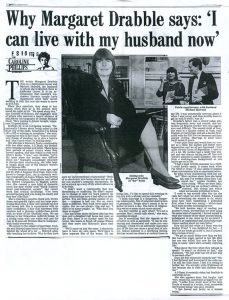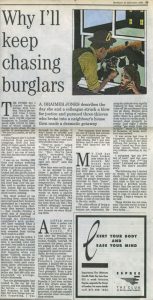It’s very brutal and violent with executions and torture. ‘But kids love that. It’s a family show,’ says Jeremy Isaacs, director general of the Royal Opera House and former chief executive of Channel 4. He’s talking about Puccini’s opera, Turandot. The first time ever that the Royal Opera House is staging an opera at Wembley Arena.
It’s very brutal and violent with executions and torture. ‘But kids love that. It’s a family show,’ says Jeremy Isaacs, director general of the Royal Opera House and former chief executive of Channel 4. He’s talking about Puccini’s opera, Turandot. The first time ever that the Royal Opera House is staging an opera at Wembley Arena.
‘It’ll bring opera to people who don’t normally go, many of whom have heard the tune the BBC plastered all over their World Cup coverage,’ he says. ‘They can have popcorn and a terrific time.’
During the course of our interview, Isaacs spoke of his impressive artistic achievements and the problems that have beset him at the Opera House. Revealingly, he also talked for the first time of his brother’s assassination at the hands of terrorists, the painful death of his first wife, his remarkable parents and his childhood. This from a man who is notoriously private about his family.
He is sitting in his voluminous office wearing a jazzy tie and socks that don’t match. Nearby is his bright plastic dispenser of chocolate Smarties (all eaten) – at Channel 4 he kept a bowl of jelly beans – and a John Glashan Spectator cartoon of Michelangelo painting the Sistine Chapel. ‘I don’t like it either,’ the Pope is saying to some religious chappie. ‘But it’s too late to get someone else.’
Isaacs is not tall, and has a strong face with a prominent nose, wavy grey hair and small brown eyes, with the aura of somebody powerful in an understated way. He takes himself seriously for the purposes of the interview – which he doesn’t like doing – but off tape there are flashes of humour and geniality. One imagines a kindly, sensitive, quiet and gentle soul, but also one who wants his own way, doesn’t suffer fools, finds criticism hard to bear and has a bruised self-esteem. Known as someone who likes a drink, one can also imagine him eating emotionally.
The first of the two tragedies in his life came on 4 July 1975, when his brother Michael and sister-in-law were killed by a PLO bomb in Jerusalem. ‘I saw the television news at Thames and thought ‘hmm’, and went home after work. At about six o’clock a relative came to tell me that they’d heard on the phone that among the dead were my brother and his wife. My brother was unhappy in this country and had emigrated to Israel where he was very fulfilled and content. They had two children.
‘They left the children with her mother on a Friday morning to go and do some shopping, and 20 minutes later there was a loud bang and they were both dead from a bomb that had been put behind a refrigerator at a traffic light.’
Isaacs went to Hove that evening to tell his parents what had happened. ‘I caught the train with Tamara (his first wife), and I rang the bell and they opened the door. Of course, they always knew when I was coming to see them. On this occasion they were aghast to see me. They knew something was wrong. They went into the sitting-room and sat down and I told them what had happened.
‘My father gave a howl of pain and grief like a wounded animal. I’ll never forget the noise that he made, and my mother clutched the arms of her chair. With tears streaming down her face, she said, ‘Isidore, we must go on’. I thought that was staggering and wonderful. Really she was saying to him, ‘Don’t let this crack you’. It didn’t mean she wasn’t distraught with grief, but she knew she had to find the strength to go on.’
Isaacs grips his hand in a fighting fist, choking back emotion. ‘That’s what I get from my parents,’ he says, punching the air.
The second tragedy to befall him was the death of his South African-born wife Tamara, whom he met after studying at Oxford. ‘I was very happily married for 28 years. Then in 1986, Tamara died of cancer. I coped by hurling myself the more into this and other things. I think one of the reasons that I left broadcasting was that Tamara’s death was the end of a great chapter in my life.’ He sounds choked and his sadness is palpable. ‘I partly put in for the job of director general at the BBC because I think she would have wanted me to.’
What of his relationship with his parents? His father – ‘quiet, courteous, scholarly, self-fulfilled’, in his words – was a jeweller who left school at 14. His mother, a formidable woman, was a doctor to the tenement tenants in the Gorbals and helped sustain the family during the 1930s slump. This helps one understand the radical, slightly Leftish and pugnacious tendencies for which Isaacs was renowned in broadcasting. >From his parents, he says he inherited enjoying being at home, and a liking for paintings, travel, celebrations and small parties.
Isaacs recalls a happy childhood. But, aged seven, along with his two younger brothers, he became a wartime evacuee, sent to the country for five years. ‘That was pretty traumatic. There was a sense of loss and being cut off from our parents. It severed bonds at an early age that took some repairing later.’
He was an achiever who did well at school and then won an exhibition to Oxford, where he got a second in Greats. He played cricket, football, joined the Labour Club and was president of the Oxford Union. ‘Maybe it had something to do with being Jewish in Scotland. One felt one had something to prove,’ he has said.
Director generalship of the BBC, to his mind the heights of broadcasting, would have been such validation. When he didn’t get the job, he sold the family home, left broadcasting and married Gillian Widdicombe, now arts editor of the Observer. ‘I began again, in a way.’
Both Isaacs’s children have now left home. ‘I don’t see a great deal of them. Yeah, I get on pretty well with them.’ He is also happily remarried. ‘I’m the marrying type, really. If you’re with someone you love, it’s bound to help both of you. Gillian is pretty tough, you know. She has her very sound and strong critical opinions. I don’t want to hear too many of her home truths at 11.30 at night.’
He must mentally compare his wives and still feel grief. ‘Wounds heal, wounds heal,’ he says, sadly. ‘I’m grateful for it rather than mourning it. Of course I still think of my first wife. But ‘the past is a different country’ . . .’
The country in which he now resides is the Opera House. Isaacs, appointed there in 1985, has been assailed on all sides. ‘There hasn’t been never-ending criticism,’ he says. ‘There has been lots of lovely praise, though the newspapers don’t remember it. This season has had a terrific critical response.’ He fidgets and fiddles and coughs, and sometimes stutters ever so slightly.
Isaacs has been attacked for his policies, financial strategies and productions, and has suffered ongoing financial difficulties, dissent and problems of morale. He has alternately been accused of alienating Government, Arts Council, sponsors, the Press and even the opera-going public.
Most recently, there was a debilitating industrial dispute, just settled, which lost £580,000 at the box office. Meanwhile, the Covent Garden deficit approaches a projected £3 million and prices for seats have become astronomical. Publicly, Isaacs’s response to criticism has been to emphasise the artistic quality of the productions.
‘I don’t feel we have cracked it here (cough) but I feel pretty pleased with what has happened since I have been here (cough),’ he says. He then talks seamlessly, bemoaning his ‘wholly inadequate public funding’ and defending himself artistically against critics of his three companies. ‘I can never say, ‘I’m going to spend the next three months or even three weeks or even three days going into rehearsal, watching what we do, seeing if my ear or eye can help improve things’. Because every single day one is wrestling with accounts. People shouldn’t be in that hand-to-mouth situation. One’s colleagues abroad can’t understand how we stick it or achieve what we do.’
And the personal toll of such unremitting pressure? ‘If you ask why the job sometimes threatens to get me down, it’s because the financial problems never go away, never let up. I don’t think I’m tetchy or aggressive. I’m my old ebullient self. But the problems here are very wearing and unceasing. I grit my teeth, but it’s difficult to see an end to them.’
Would he rather do something else? ‘No, this is a wonderful job,’ he says, with broadcasterly exuberance. ‘It is hugely demanding, taxing and very difficult. I enjoy it. But I don’t want to do it forever – and they may not want to keep me.’
He’s 59 years old. ‘I think I’ll retire at 65, if I last that long. I enjoy being busy. But already I dream about reading (political biographies and history), walking and seeing the world. Of doing different things, daft ideas which won’t happen.’
He has worked seven-day weeks at various stages during his career. A perfectionist, wanting to make sure that every single frame in his film was exactly as it should be. (He spent 30 years in broadcasting and misses being engaged in the world on a broader front.) He might make television programmes again, but he doesn’t want another job in television. (He claims to have got over his upset at Michael Grade being appointed to succeed him at Channel 4.) ‘I had lunch the other day with Michael Checkland, director general of the BBC. I told him this has been the hardest grind I’ve ever encountered. But I’m glad I came here and didn’t get his job. I think that may have been too much for me. It’s a hell of a job.’
One suspects Isaacs would have punched his fist in the air, and had a jolly good go.



